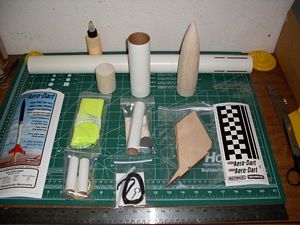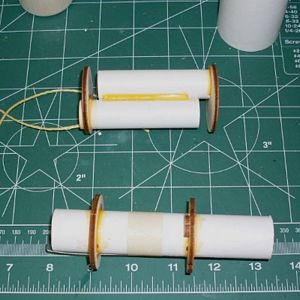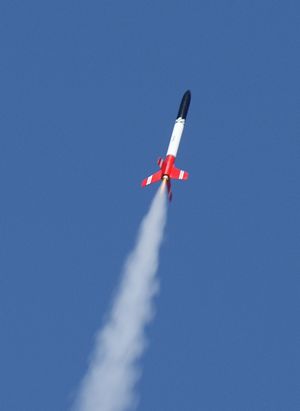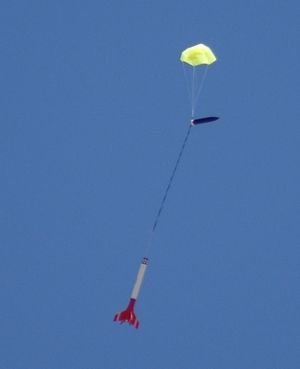| Construction Rating: | starstarstarstarstar |
| Flight Rating: | starstarstarstarstar_border |
| Overall Rating: | starstarstarstarstar |
| Diameter: | 1.84 inches |
| Length: | 36.80 inches |
| Manufacturer: | Semroc  |
| Skill Level: | 1 |
| Style: | Clone, Sport |

Brief:
The SLS Aero-Dart is another Semroc Large Scale Rocketry design based on a classic Centuri kit but with improvements
like an ejection baffle, laser cut basswood fins that mount through-the-wall, a removable 24mm engine mount to be
swapped with an optional 29mm engine mount, and an 18" rip stop nylon parachute. The rocket is an impressive
addition to most any rocket fleet.
Construction:
The quality of materials supplied in this kit is truly worth the additional price of the kit. With this kit you get:
- 1 Heavy-duty Semroc large body tube with laser cut fin slots
- 1 Heavy-duty Semroc large body tube for the payload section
- 1 Balsa nose cone
- 1 Balsa tube couple
- 4 Pre-cut basswood fins
- 1 24mm interchangeable motor mount kit with plywood centering rings
- 1 Ejection baffle kit with Kevlar® string
- 1 18" rip stop nylon parachute (preassembled)
- 1 Parts bag with launch lugs, shock cord, and eye hook
- 1 Decal sheet
- 1 Color instruction sheet
The rocket is assembled like most other rockets I have built. You start with the motor mount. Since the mount is interchangeable with a 29mm motor mount (not supplied with the kit), you need to pay close attention to where the centering rings are located on the engine tube. The instructions let you know that there needs to be at least 2" of space between the rings for the motor mount to properly lock into the body tube. After assembly, mine was a little loose so I wrapped some masking tape around the lower ring which tightened everything up nicely. After the motor mount, you work on the ejection baffle. It consists of a couple of tubes that are glued together and are offset by a pair of plywood centering rings. You are required to attach the Kevlar® string to the baffle that will anchor the shock cord.
 The basswood fins are pre-cut so all you need to do is some light sanding before mounting
them. Since this kit uses through-the-wall fin mounting, you need to lightly sand the slots in the pre-cut body tube
for the fins to fit properly. Make certain that the notches on the fin tabs that go through the wall of the body tube
do not get any glue on them. The next step is to glue the ejection baffle into the body tube. The instructions have you
put a ring of glue inside the body tube 5 to 6 inches from the top using a long glue applicator. I believe that this
was supposed to be included in the kit but was missing. No worries, I just taped a Q-Tip to the end of a scrap piece of
balsa to reach inside the body tube. It goes without saying that you want to make sure that you glue the ejection
baffle in with the Kevlar®
string coming out the top of the body tube.
The basswood fins are pre-cut so all you need to do is some light sanding before mounting
them. Since this kit uses through-the-wall fin mounting, you need to lightly sand the slots in the pre-cut body tube
for the fins to fit properly. Make certain that the notches on the fin tabs that go through the wall of the body tube
do not get any glue on them. The next step is to glue the ejection baffle into the body tube. The instructions have you
put a ring of glue inside the body tube 5 to 6 inches from the top using a long glue applicator. I believe that this
was supposed to be included in the kit but was missing. No worries, I just taped a Q-Tip to the end of a scrap piece of
balsa to reach inside the body tube. It goes without saying that you want to make sure that you glue the ejection
baffle in with the Kevlar®
string coming out the top of the body tube.
From there you are instructed to mount the launch lugs midway between two of the rocket fins. The bottom lug goes 1/4" from the bottom of the rocket and the instructions tell you to glue the upper lug about 2" from the top of the tube. This is what I did but when I went to apply the decals, the checkered body wrap that goes at the top of the tube is 2-1/8" inches wide. Instead of cutting the decal for it to fit around the launch lug, I trimmed a 1/8" off the end of the launch lug. If you plan to build this rocket, make sure you mount the upper launch lug at least 2-3/16" down from the top of the tube.
 The assembly of the payload section consists of gluing the balsa tube coupler into the upper
section and friction fitting the nose cone onto the top of the tube. Everything fit together very nicely with no need
for sanding or adding any masking tape. You glue the eye hook into the balsa coupler and tie one end of the shock cord
to it and the other end to the Kevlar®
string. The only thing remaining to be done is attach the pre-assembled nylon parachute to the rocket. I will admit
that I was surprised to see that a snap swivel was not included in a kit of such high caliber. I used a heavy duty
black one that I had picked up in the Wal-Mart sporting goods section.
The assembly of the payload section consists of gluing the balsa tube coupler into the upper
section and friction fitting the nose cone onto the top of the tube. Everything fit together very nicely with no need
for sanding or adding any masking tape. You glue the eye hook into the balsa coupler and tie one end of the shock cord
to it and the other end to the Kevlar®
string. The only thing remaining to be done is attach the pre-assembled nylon parachute to the rocket. I will admit
that I was surprised to see that a snap swivel was not included in a kit of such high caliber. I used a heavy duty
black one that I had picked up in the Wal-Mart sporting goods section.
Finishing:
I decided that I would use the classic Aero-Dart paint scheme shown on the front of the instruction manual. I used
Elmer's Fill 'n' Finish on the nose cone and to fill spirals in the tube but not on the basswood fins. After sanding, I
used some heavy gray auto primer on the entire rocket. I sanded nearly all the auto primer off then used a couple coats
of white primer before moving to the final paint scheme. The payload section and nose cone were painted black. The
lower body is painted white with the fins and very bottom of the rocket painted red. There is very little masking that
needs to be done to paint the rocket. I decided to paint the white strips on the fins after I painted the fins red. I
used 1/8" pin striping masking tape that I had gotten at an auto parts store to mask the red strip. The decals
went on with no problems whatsoever.
Construction Rating: 5 out of 5
Flight:
Since this rocket is suppose to fly to 850' on the recommended E9-6 motor, I waited to launch it at the annual
Fillible's Folly with the Oregon Rocketry Enthusiasts Organization (OREO) where the field is large enough to support
that engine. I originally loaded an E9-6 for the first flight. A steady breeze and picked up by the time I was ready to
launch the SLS Aero-Dart. The Range Safety Officer (RSO) thought that a 6 second delay was too long for the wind
conditions and recommended that I use a 4 second delay to prevent zippering the body tube. I decided to follow the
RSO's recommendation and changed the engine to an E9-4. At ignition, the rocket slowly and majestically left the launch
pad and ever so slightly veered with the wind to an altitude of at least 800' feet. I didn't see which way the rocket
was pointing at ejection but my guess was it was still moving upward rather quickly. There was evidence at the top of
the body tube that the Kevlar®
string was yanked hard into the top of the tube. I am fairly certain that if the rocket was constructed with a normal
tube that it would have zippered. For this reason I will make sure to use the recommended motors for future launches.


Recovery:
As explained in the construction section, the rocket is equipped with an ejection baffle so there is no need for
recovery wadding. There was no evidence of char marks on the chute so the ejection baffle worked as designed. The
18" lime green chute gently returned the rocket to the ground with not too much drift given the wind conditions.
The supplied shock cord with the kit is about 30" long. That length coupled with the extension of Kevlar®
cord would make me think that the shock cord was long enough but yet there was a dent in the bottom of the balsa
coupler where the top of the tube collided with it. The body tube showed no sign of the impact.
Flight Rating: 4 out of 5
Summary:
If you are looking for a solid rocket that will enable you to get started with mid-power motors, I would suggest that
the Semroc SLS Aero-Dart might be what you are looking for. I hesitate in making that statement only because I have not
launched the rocket with any mid-power engines. Be assured that I will be doing so because this was the primary reason
I purchased this rocket. The rocket may be more expensive than your normal LPR kit but the quality of materials and the
versatility in motor selection make it well worth the price.
PROs: Classic designed improved, ejection baffle, quality parts, interchangeable engine mount, and the construction should last for many years.
CONs: Longer shock cord needed and no snap swivel for parachute included (I'm nitpicking since there really is nothing wrong with this rocket kit.)
Overall Rating: 5 out of 5
 |
 |
Flights
 |
 |
 |
 |
D.K.B. (November 9, 2009)